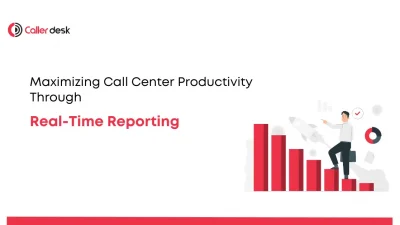These days, many people don’t answer calls from unknown numbers. Because of that, some sales teams stop calling and just send emails or messages.
But here’s something you may not know:
Sales calls still work — and they work really well.
One company started calling people just after they signed up on their website. In only 3 months, they made way more calls and closed more deals. They didn’t use any big setup — just smart calling with the help of cloud tools.
When you call someone at the right time, they feel heard. They can ask questions. And you can help them understand why your product is useful.
Today, calling is much easier than before. With cloud telephony, you don’t need any machines or landlines. You can call using your mobile or laptop, see your call reports, record calls, and even talk to more people in less time.
Let’s get started.
What Is Outbound Calling? (And Why It Matters)
Outbound calling is a sales strategy where you reach out to a potential customer before they try to contact you.
Instead of waiting for someone to call or message your business, you take the first step to start the conversation.
This approach is widely used by sales teams to actively connect with leads who may be interested but haven’t made a move yet.
When do businesses use outbound calling?
You should use outbound calling when:
- A user signs up on your website but doesn’t complete the next step
- A potential customer fills out a lead form but doesn’t respond to emails
- Someone browses your pricing or product page without making a purchase
- A past lead stopped replying or went cold
In all these cases, outbound calling gives you a chance to re-engage the lead before the opportunity is lost.
Why Do People Avoid Making Sales Calls?
Many sales teams today stop making calls – not because calling is bad, but because it feels more difficult. Here’s why:
1. People Don’t Answer Unknown Numbers
Most people get a lot of spam or marketing calls. So, when they see a number they don’t know, they often ignore it.
Salespeople feel like they’re wasting time if no one picks up the phone.
2. Calls Take More Time and Effort
Making a call isn’t as quick as sending a message or email.
You need to:
- Choose the right time to call
- Be ready to talk and answer questions
- Focus on each person individually
This takes more effort, so many teams avoid it.
3. Messages Feel Easier and Faster
Emails, chats, and social media messages are easy to send to many people at once.
That’s why some sales teams think it’s better to use digital methods. But the problem is — these messages often don’t feel personal or helpful.
5 Easy Tips to Make Your Sales Calls Work Better
1. Call Leads Within the First Hour
Speed matters. A lot.
Studies show that leads are 9x more likely to answer and engage if you contact them within 60 minutes of showing interest.
Why?
Because the lead still remembers your brand. Their interest is fresh.
What to do:
Set up alerts or use a cloud telephony tool like CallerDesk to instantly notify your sales team when a new lead comes in. Make it a rule: Call them within an hour.
This small change alone can double your call success rate.
2. Start with Help, Not a Sales Pitch
Nobody likes to be sold to in the first 10 seconds.
Instead of jumping into your product features, begin with a friendly, helpful tone.
Try this opener:
“Hey, I noticed you signed up recently. I just wanted to check in — is there anything you’re trying to figure out?”
This shows you care about their experience — not just the sale. It also encourages them to open up and share their pain points.
3. Listen More Than You Talk
The best salespeople ask questions and listen carefully.
Your first job is to understand what the lead wants. Only then should you explain how your product or service can help.
Ask things like:
- “What are you trying to fix or improve?”
- “Have you used anything like this before?”
- “What made you sign up today?”
When you listen, you learn. And that helps you respond better.
4. Use Tools to Stay Fast and Organized
You can’t make 20+ calls a day if you’re searching for numbers, writing everything down manually, or getting lost in follow-ups.
Use smart tools that let you:
- Call directly from your contact list or CRM
- Save notes after each call
- Keep track of who you spoke with and what they said
Being organized helps you stay focused-and close more deals without burnout.
5. Track What Works and What Doesn’t
Every sales call teaches you something — but only if you review it.
Write down:
- What worked well
- What questions got good responses
- What caused the lead to lose interest
Over time, you’ll see patterns. You can improve your script, cut out weak parts, and focus on what really connects with people.
Try This Simple 1-Week Sales Call Experiment
Want to see if outbound calling can actually boost your sales?
Here’s a small test you can try with your team this week:
What to Do:
- Call every new lead within 1 hour of them signing up, filling a form, or showing interest.
- When you call, ask a helpful question like:
“What do you need to see or understand from us to move forward?” - Listen carefully to their response. Don’t pitch right away — just understand their need.
- If they’re interested, guide them to the next step – like a free demo, trial, or consultation.
- Track your results at the end of the week:
- How many people picked up?
- How many asked for help?
- How many turned into customers?
Even if not everyone buys right away, these calls often turn cold leads into warm ones — and that’s a win.
Conclusion
Sales calls aren’t dead — they’ve just evolved.
In a world full of emails, ads, and messages, a simple phone call can still make a big difference. When done right, sales calls help you connect with real people, answer real questions, and build real trust.
Using cloud telephony tools like CallerDesk, your team can:
- Call loads faster
- Stay organized
- Track results
- And close more deals without extra effort
So if you’re still ignoring sales calls, you might be missing out on real opportunities.
It’s time to bring smart calling back into your sales process — and turn more leads into paying customers.





